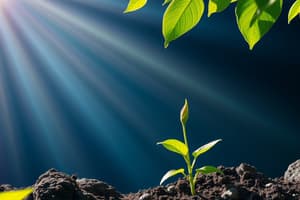Podcast
Questions and Answers
What is a granum?
What is a granum?
Structure in chloroplast where sunlight energy is captured, composed of thylakoids.
What are lamellae?
What are lamellae?
Structures that connect together grana.
What is stroma?
What is stroma?
Gel-like substance that surrounds lamellae.
What is a thylakoid?
What is a thylakoid?
What is photosynthesis?
What is photosynthesis?
What is glucose?
What is glucose?
What is the Calvin Cycle?
What is the Calvin Cycle?
What is chlorophyll?
What is chlorophyll?
What are light reactions?
What are light reactions?
What are dark reactions?
What are dark reactions?
What is carbon fixation?
What is carbon fixation?
What is an autotroph?
What is an autotroph?
What is a chloroplast?
What is a chloroplast?
What is ATP?
What is ATP?
What is sunlight?
What is sunlight?
Flashcards are hidden until you start studying
Study Notes
Granum
- Composed of stacked thylakoids, serves as the site for capturing sunlight energy in chloroplasts.
- Plays a critical role in the light reactions of photosynthesis.
Lamellae
- Structures that connect grana, acting as bridges between them for efficient energy transfer.
Stroma
- Gel-like substance surrounding the thylakoids in chloroplasts.
- This region facilitates the enzymatic reactions necessary for the dark reactions of photosynthesis.
Thylakoid
- Disc-shaped sacs within the inner membrane of chloroplasts.
- Essential for converting light energy into chemical energy during photosynthesis.
Photosynthesis
- Process by which plants harness the sun's energy to convert water and carbon dioxide into sugars.
- Fundamental for plant growth and energy production.
Glucose
- Chemical formula: C6H12O6.
- Serves as a primary quick source of energy for plants and many organisms.
Calvin Cycle
- A biochemical pathway where carbon dioxide is converted into glucose using energy from ATP and NADPH.
- Also known as the dark reactions, as it does not require light directly.
Chlorophyll
- The green pigment found in plants that absorbs light energy for photosynthesis.
- Vital for the conversion of solar energy into chemical energy.
Light Reactions
- The initial phase of photosynthesis that requires light to occur.
- Begins with the absorption of light by chloroplasts to generate energy-rich molecules.
Dark Reactions
- Reactions in photosynthesis that do not require light but depend on products from light reactions.
- Utilize ATP and NADPH to form glucose.
Carbon Fixation
- The process of incorporating carbon from carbon dioxide into organic compounds.
- An essential step for autotrophic organisms in building macromolecules.
Autotroph
- Organisms that produce their own food using sunlight, water, and carbon dioxide.
- Include plants, algae, and some bacteria.
Chloroplast
- A specialized plastid that contains chlorophyll.
- The principal site of photosynthesis in plant cells.
ATP (Adenosine Triphosphate)
- A key energy carrier in all living cells, powers various cellular processes, including active transport.
- Can induce conformational changes in transport proteins to facilitate solute movement.
Sunlight
- The primary energy source for the photosynthetic process.
- Essential for driving the overall mechanism of photosynthesis in plants.
Studying That Suits You
Use AI to generate personalized quizzes and flashcards to suit your learning preferences.




